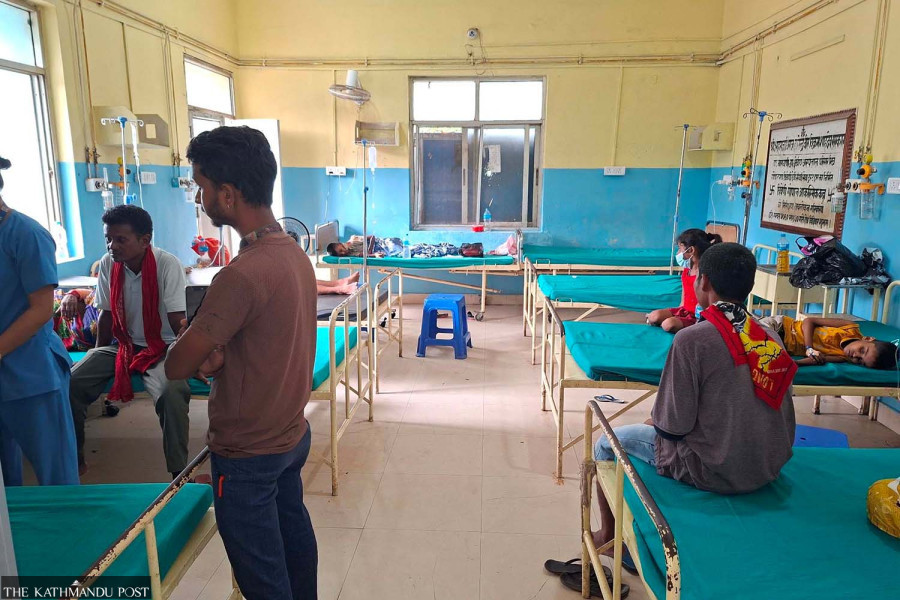Health
Cholera cases jump in Parsa district
Health authorities have sought more manpower from the provincial government.
Arjun Poudel
A new infection of cholera, a deadly waterborne disease that first broke out in the first week of August, is starting to resurge in the local units of Parsa district including in Birgunj Metropolitan City.
Health officials serving in the district said the number of new infections has risen fourfold in the last few days.
“The number of new cases had declined to around six-seven until a few days ago,” said Jayamod Thakur, an official at the Health Office, Parsa. “But the number rose to 28 yesterday [Monday]. Hospitals are reporting a surge of new cases.”
Cholera is a highly infectious disease that causes severe diarrhoea and vomiting, which can lead to dehydration and death within a few hours if left untreated. The National Public Health Laboratory, which carried out tests on stool samples of the infected people, confirmed that Vibrio cholerae o1 Ogawa serotype is responsible for the outbreak.
So far, at least four people have died and over 1,500 others hospitalised. Health officials working in the disease-hit areas say a dozen people are getting infected with the potentially fatal disease every day and it is still out of control despite their efforts.
“We had 24 new cases on Sunday, 14 on Monday and already seven cases this morning [Tuesday],” said Dr Chuman lal Das, superintendent at the Birgunj-based Narayani Hospital. “We are preparing to run a separate gastro ward to address the growing number of cholera patients.”
With cases of cholera infection surging again, the hospital administration has sought help from the provincial government to manage additional human resources. Officials say that medics deputed earlier to assist the hospital have already returned.
“Yes, Narayani Hospital has asked for more manpower from the provincial government,” said Thakur. “Besides, we have also sought help from religious leaders of the district for help with the awareness campaign.”
Health officials say that with an increase in rainfall and a halt to the door-to-door campaign due to the unrest caused by Gen-Z protest, infection of cholera started to rise again.
“We have decided to deploy health workers in the door-to-door campaign, teach chlorination techniques to locals and motivate them for a behavioural change,” said Thakur. “Along with this, we have also requested religious leaders to ask people of their respective faiths to drink only safe water.”
Public health experts say the Birgunj outbreak is the largest since the Jajarkot epidemic in 2009. Sixteen years ago, the far-western district of Jajarkot saw a major cholera outbreak that killed several and infected hundreds.
They say the Birgunj outbreak exposes critical gaps in the government’s preparedness and response system, and water and sanitation conditions.
Experts are particularly alarmed by both the severity of the outbreak and the deaths it has caused.
Nepal often witnesses outbreaks of water- and food-borne diseases, including cholera, during the monsoon season as floodwaters contaminate most of the drinking water sources.
Last year, at least 95 cholera cases were confirmed in Kathmandu, Lalitpur, Jajarkot, Pyuthan, Makawanpur, Rolpa, Sindhupalchok, Achham, and Rautahat districts. The health ministry administered cholera vaccine to people from the affected areas of Kapilvastu, Rautahat, and Kathmandu a few years ago to halt the spread of the disease.
Poor sanitation and hygiene make the country highly vulnerable to waterborne diseases, including diarrhoea, dysentery, typhoid, hepatitis, and cholera, especially in the monsoon season, according to doctors.
They say the risk of waterborne diseases will not decrease until the water and sanitation conditions improve, and people get safe drinking water. Several other factors, including storage conditions, supply pipes, and pollution of water sources, also determine the quality of water supplied to households.
The World Health Organisation says cholera is a global threat to public health, and a multifaceted approach is the key to controlling the disease and reducing deaths.
Meanwhile, the Ministry of Health and Population said they are preparing to administer the anti-cholera vaccine in the disease hit areas. Officials say that over 1.18 million people in Parsa and Bara districts will be inoculated in a mass vaccination drive set to start upon the arrival of doses, possibly within days.
The Global Alliance for Vaccine and Immunisation, the Global Task Force on Cholera Control, the International Federation of Red Cross and Red Crescent Societies, the World Health Organisation and the United Nations Children’s Fund have all agreed to support vaccine delivery and immunisation.




 13.12°C Kathmandu
13.12°C Kathmandu















